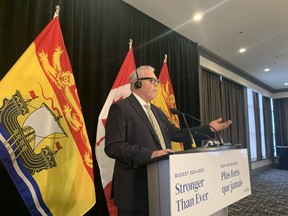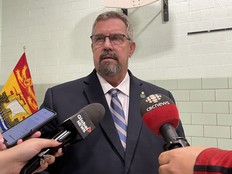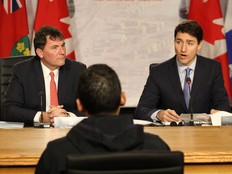Budget holds the line on health spending

Article content
The provincial government is holding the line on health spending and didn’t include any new tax cuts in Tuesday’s provincial budget, instead mostly trumpeting actions it’s already taken.
While the Tories boasted about the $3.8 billion for health spending being a record – and it is – its year-over-year budget numbers show an increase of just under $1.7 million, or 0.04 per cent more than the spend in 2023-2024. The number is, however, about $214 million more than what the government originally expected to spend.
Speaking to reporters before delivering the budget, Finance Minister Ernie Steeves said the real rise in year-over-year health spending is much bigger than 0.04 per cent, because last year’s spending included one-time costs, like travel nurses, which won’t be the case for Horizon Health Network this year.
He also said that the government is hopeful that Vitalite Health Network will be able “get out” of its travel nurse contracts, but didn’t explain how that might be achieved. One of the contracts doesn’t expire until February 2026.
Steeves also mentioned that a “tax cut, or some sort of help,” could happen later this year, but didn’t offer any details.
Richard Saillant, a Moncton-based economist and public policy consultant, summed up the budget in one word: “forgettable.”
“From an accountant’s perspective, it’s an unsurprising budget, a small surplus and the books are largely balanced,” he said, adding that the government’s revenue projections appear more realistic than in previous years, where they wildly missed the mark.
“From what I understand about what’s in the budget … it’s mostly ‘steady as she goes,’ fulfilling existing commitments. There’s not a lot of new money there. In an electoral year, it’s a forgettable budget.”
On Monday, Steeves said the government wasn’t going to introduce an election budget. On Tuesday, the plan, “Stronger than ever: let’s keep building,” showed he was true to his word.
Highlights of the $13.3 billion 2024-2025 spending plan, which represents a 6.4 per cent overall rise from last year, included:
- A projected $41 million surplus, continuing a years-long trend of the Tory government projecting basically balanced budgets;
- $70 million to help the Regional Health Authorities (RHAs) “stabilize and ease pressures” in the health system;
- $29.7 million for wage rises for a swath of personal support workers and others in the long-term care system;
- $20 million to “expand collaborative practices and improve access to primary health care”;
- $50 million for the ongoing heat pump and insulation program, half of what NB Power had requested;
- $47 million to “continue delivering” on climate change promises;
- $18.6 million to address challenges caused by school enrolment growth, and;
- $68.9 million more for the recently resurrected New Brunswick Housing Corporation.
Going into the budget, the government was facing calls to do more to help New Brunswickers facing cost-of-living challenges. But mostly the announcements made by Steeves on Tuesday involved repeating moves the government has already made, including an increase to social assistance payments, $300 affordability payments, the food and fuel benefit, and increases to allowances for low-income seniors.
He also noted that under the Tories, more than $2 billion has been cut from the province’s net debt.
Spending
A recent call from New Brunswick medical professionals for government to spend nearly $600 million extra on health care this year to help stabilize and transform a system they say is in crisis went unheeded.
The group, which included doctors and nurses, provided a series of recommendations for improvements, which tally up to $597.5 million. Some of the costs would be ongoing, while others, such as building more nursing homes, would be single-year, upfront capital costs.
Instead, the government focused on smaller investments across the board, including more money for midwifery services, cataract surgeries, mental health and addictions services, and cancer screening programs.
Steeves’s speech claimed that government is “taking steps in the right direction,” “consistent with recommendations shared by doctors, nurses, and other health professionals.” He also noted that since the Tories took office in late 2018, annual health spending has risen by $1 billion, “a 38 per cent increase in just six years.”
Virtually every province’s health spending has also skyrocketed in that time, and New Brunswick spends among the least on health on a per-capita basis.
On education, the government plans to spend about $200 million more than last year. New initiatives include more money to help students catch up from lost pandemic class time, teacher recruitment and retention, and services to help kids go to school “and address their diverse needs.”
Liberal Leader Susan Holt and Green party Leader David Coon both slammed the budget, zeroing in on health spending.
“We see no real new money for New Brunswickers’ number one priority,” Holt said, later predicting that people “will feel sick when they see this budget.”
“We don’t see any bold transformation of the health-care system that everyone has been calling for.”
Coon said the Tory spending plan “is entirely lacking in ambition” and “looks a lot like last year’s budget.”
“On health care they’re going to spend about as much as they did this year, which is horrendous given the crisis in health care,” he said.
The government’s decision not to follow recommendations from health system professionals like doctors and nurses shows the Tories are “clearly not interested” in making the “generational” investments that are needed, Coon said.
Jay Goldberg, the interim Atlantic director for the Canadian Taxpayers Federation, said while he was pleased to see the Tories continue to chip away at the debt, there was plenty of spending room for government to do more to help struggling New Brunswickers.
– With files from John Chilibeck












Postmedia is committed to maintaining a lively but civil forum for discussion. Please keep comments relevant and respectful. Comments may take up to an hour to appear on the site. You will receive an email if there is a reply to your comment, an update to a thread you follow or if a user you follow comments. Visit our Community Guidelines for more information.